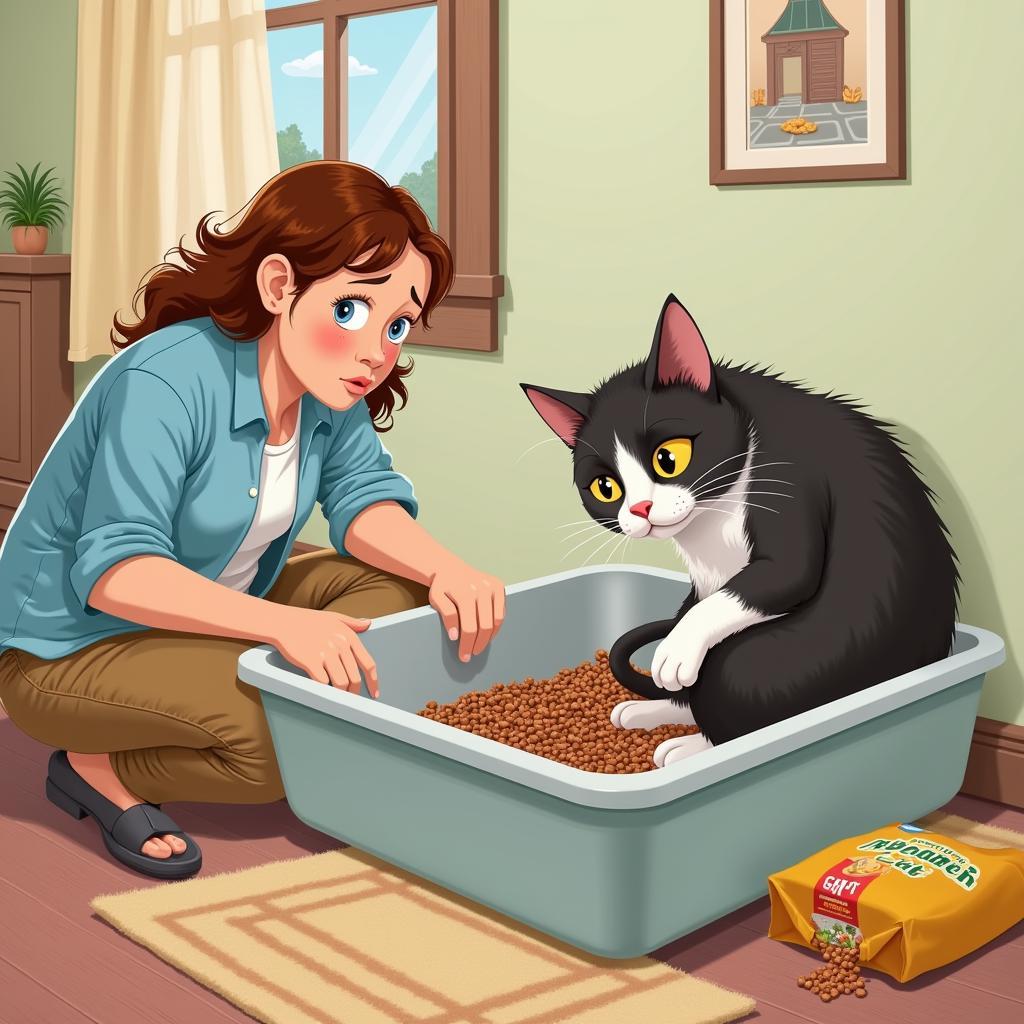Can Too Much Dry Cat Food Cause Diarrhea? Absolutely. While dry food is a staple in many feline diets, overfeeding can disrupt your cat’s digestive system and lead to diarrhea. Let’s explore why this happens and how to prevent it.
Understanding the Link Between Dry Food and Diarrhea
 The Connection Between Dry Cat Food and Diarrhea
The Connection Between Dry Cat Food and Diarrhea
One of the main culprits behind dry food-induced diarrhea is the high concentration of carbohydrates. Cats are obligate carnivores, meaning their bodies are designed to thrive on a meat-based diet. Excess carbohydrates can ferment in the gut, leading to gas, bloating, and ultimately, diarrhea. Another contributing factor is the low moisture content of dry kibble. If your cat isn’t drinking enough water, the dry food can absorb moisture from the intestines, resulting in dehydration and loose stools.
Dehydration and Its Impact
Dehydration plays a significant role in feline diarrhea. Dry food, by its very nature, contains minimal moisture. Cats consuming large amounts of dry food without sufficient water intake can become dehydrated, leading to digestive upset. This dehydration further complicates the digestive process, making diarrhea more likely. Always ensure your furry friend has access to fresh, clean water, especially if they primarily eat dry food. You can even consider adding a little water to their kibble to encourage hydration.
How Much Dry Food is Too Much?
Determining the right amount of dry food depends on factors like your cat’s age, activity level, and overall health. Consult your veterinarian or check the feeding guidelines on your cat food packaging for recommendations. However, these guidelines are just a starting point. Observe your cat’s weight and body condition. If they’re gaining weight or their stools are consistently loose, you might be overfeeding. You might consider switching to a highest protein kitten food for a growing kitten.
Recognizing the Signs of Overfeeding
Overfeeding can manifest in several ways, including vomiting, frequent hairballs, and changes in behavior. Cats who are overfed may become lethargic or show decreased interest in playing. Regular monitoring of your cat’s eating habits and overall condition is crucial for identifying and addressing overfeeding. If you’re unsure about the ingredients in your cat’s food, you might want to research ingredients like sodium selenite in cat food.
Preventing Diarrhea from Dry Cat Food
Several strategies can help prevent dry food-related diarrhea. Portion control is paramount. Measure your cat’s food according to their individual needs and avoid free-feeding, which can lead to overconsumption. Transitioning to a new food gradually can also minimize digestive upset. If you decide to change your cat’s food, mix the new food with the old over several days to allow their digestive system to adapt. Consider trying some dog food recipes crockpot for your canine companion. Furthermore, adding moisture to dry kibble can promote hydration and prevent dehydration-related diarrhea.
Dr. Emily Carter, DVM, a renowned veterinarian with over 20 years of experience, emphasizes the importance of proper hydration: “Water is essential for healthy digestion. Encourage your cat to drink more water by providing fresh water sources and even adding a little water to their dry food.”
Conclusion
Can too much dry cat food cause diarrhea? Yes, it certainly can. By understanding the factors contributing to this issue, you can take proactive steps to protect your cat’s digestive health. Remember to monitor their food intake, ensure adequate hydration, and consult your veterinarian if you notice any persistent digestive problems. For pet owners who also have dogs, you might be interested to know if can dogs have avocado oil in their food. Understanding their dietary needs is key to their health and well-being.
FAQ
- What are other causes of diarrhea in cats besides dry food?
- How can I transition my cat to a new food without causing digestive upset?
- How much water should a cat drink daily?
- What are the signs of dehydration in cats?
- Is wet food a better option for cats prone to diarrhea?
- What should I do if my cat has persistent diarrhea?
- Are there specific ingredients in dry cat food that can trigger diarrhea?
Common Scenarios
- Scenario 1: A kitten experiences diarrhea after switching abruptly from mother’s milk to dry kibble.
- Scenario 2: An older cat develops chronic diarrhea after years of consuming a single brand of dry food.
- Scenario 3: A cat experiences intermittent diarrhea despite having access to fresh water and regulated portions of dry food.
Other helpful resources:
- Explore our article on powdered cellulose in cat food to understand its role in your cat’s diet.
Need help?
Contact us for 24/7 support. Phone: 02437655121, Email: [email protected] Or visit us at: 3PGH+8R9, ĐT70A, thôn Trung, Bắc Từ Liêm, Hà Nội, Việt Nam.